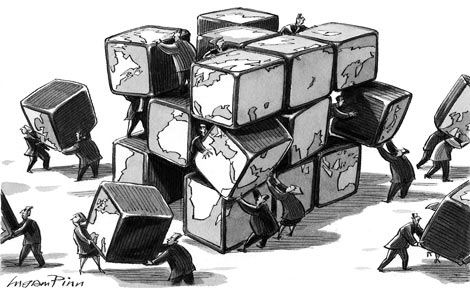“NGOs can make global governance transparent and democratic”
July 10th, 2013 In order to achieve effective global governance, countries must cooperate with each other, writes Latoyaa Roberts, 25, a Correspondent from Trinidad and Tobago. She discusses the importance of non-state actors in securing a form of governance that is beneficial on a global scale.
In order to achieve effective global governance, countries must cooperate with each other, writes Latoyaa Roberts, 25, a Correspondent from Trinidad and Tobago. She discusses the importance of non-state actors in securing a form of governance that is beneficial on a global scale.
I have often heard the terms “global governance” and “good governance” used simultaneously as a model answer for how to make the world a better place.
The term “global governance” took on immense popularity in the 1990s because it was fuelled by the hype of globalization. Globalization fosters notions of a smaller world and one global space.
It encourages thinking of societal issues in a global context and interlinks trans-border issues. This eventually results in a complex interdependence between states.
Nevertheless, the principles of global governance were in existence well before the term became popular. Countries have always been working together to solve immense issues that surpass their borders.
Examples include the Concert of Europe from 1815 to 1914 and the formation of the United Nations in 1945. However, today global governance has become increasingly dense and severely complex because of the various parties that contribute to world affairs. The child, the family, the school, the community, the country, the regional and international organizations have all become heavily involved in the process of global governance.
Thomas Weiss, an excellent writer on global governance, once stated that global governance is an “instance of governance in the absence of government”. Underlying this definition is the assumption that the world should be governed.
However, one may ask why does the world need to be governed? After all, the United Nations is not the world government nor is Secretary-General Ban Ki-Moon the world president. No one country or one main organization dominates all the issues that continually proliferate daily in the world. But due to the transformations and complexities of the modern world, it is within the best interest of the people and their countries to realize the benefits of producing norms and values that regulate global public goods, monitor and prevent global problems and propose solutions that will continually make this world a safer place.
In order to achieve this ultimate purpose, all actors in the international system cooperate and interact in a complex interdependence called multilateralism.
The increase in non-state actors such as the civic groups, renowned businessmen and non-governmental organizations has made it even harder for countries to ignore the role and relevance of them in helping with global issues.
Firstly, the giant increase in the number of non-state actors draws paramount attention. There are countless NGOs in existence, all making a positive impact on society. Secondly, global governance has been traditionally limited to the authority of a few countries, which handle most of the affairs. In present society, however, new diplomacy has created a space and need for NGOs to ensure good and effective governance. Thirdly, some global issues such as global warming, money laundering or human trafficking are too large to be dealt with by one state, especially in developing countries that lack many resources. International NGOs have trans-border networks with insurmountable resources that can quickly attend to issues that some countries may be reluctant or unequipped to deal with.
Non-state actors are good for international development since they can broaden participation, produce results, improve quality of governance and promote lasting agreements. Non-state actors and, more specifically, NGOs can make global governance transparent, democratic and accountable as they assist in agenda setting, perform duties of representation, collaboration and consultation within larger global institutions such as the United Nations and the World Bank. NGOs make the idea of global governance legitimate.
As mentioned by the Secretary General for the United Nations at the World Economic Forum in 2009, “our times demand a new definition of leadership – global leadership. They demand a new constellation of international cooperation – governments, civil society and the private sector, working together for a collective global good”. In short, the presence of non-state actors in global governance is good for business.
Photo copyright http://www.tf.com/
…………………………………………………………………………………………………………………
About me:
The world is my oyster and I love exploring it. My best exploration thus far was as an English teacher in Japan, frequently visiting other Asian countries. Now, I am a Secondary School English teacher in my country but in the future I want to become a Communications Specialist for an international organization.
My first degree is in Communication Studies with Linguistics and International Relations. I also obtained a M.Sc in Global Studies and I am currently pursuing a M. Phil International Relations.
…………………………………………………………………………………………………………………
Opinions expressed in this article are those of the author and do not necessarily represent the views of the Commonwealth Youth Programme. Articles are published in a spirit of dialogue, respect and understanding. If you disagree, why not submit a response?
To learn more about becoming a Commonwealth Correspondent please visit: http://www.yourcommonwealth.org/submit-articles/commonwealthcorrespondents/
…………………………………………………………………………………………………………………




